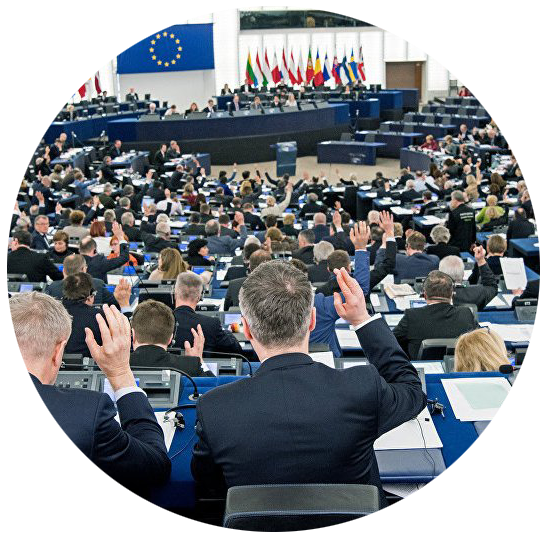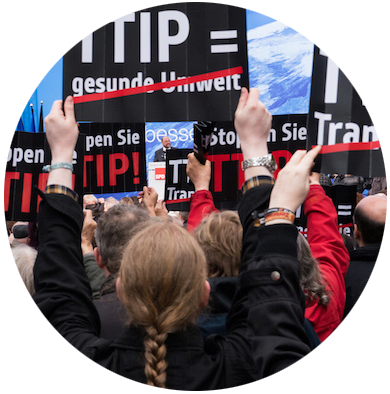ARE THE TTIP NEGOTIATIONS TRANSPARENT?
WE INVESTIGATED WHAT INFORMATION IS AVAILABLE AND WHAT IS NOT.
HERE’S WHAT WE FOUND
TTIP TRANSPARENCY OVER TIME
WHAT ARE THE KEY DOCUMENTS?
WHICH INFORMATION IS PROACTIVELY PUBLISHED?
EU textual proposals
Scroll over to find out if they are proactively publishedEU textual proposals
Since January 2015, following public pressure, the EU Commission has disclosed textual proposals on a rolling basis.EU position papers
Scroll over to find out if they are proactively publishedEU position papers
Since January 2015, following public pressure, the EU Commission has disclosed position papers on a rolling basis.Consolidated texts
Scroll over to find out if they are proactively publishedConsolidated texts
The EU Commission does not proactively disclose to the public ongoing or final consolidated texts that bring together EU-US positions. These are available however, to MEPs and national MPs via ‘reading rooms’.Legal Advice
Scroll over to find out if they are proactively publishedLegal Advice
The EU Commission publishes legal reports from external experts, but it does not proactively publish the internal legal advice it receives.Drafts, non-papers and other
Scroll over to find out if they are proactively publishedDrafts, non-papers and other
The EU Commission does not proactively disclose drafts and non-papers to the public.Minutes of meetings
Scroll over to find out if they are proactively publishedMinutes of meetings
Advisory Group minutes of meetings are published proactively, while minutes of meetings with other third-parties (such as lobbies) are not.Agendas
Scroll over to find out if they are proactively publishedAgendas
The EU’s transparency policy has not been extended to include publishing proactively the work agenda or list of meetings of the EU Chief Negotiator. The rules do apply to Commissioners’ and Directors-General’s record of meetings.Correspondence
Scroll over to find out if they are proactively publishedCorrespondence
The EU Commission does not proactively publish relevant correspondence related to TTIP to the public.US docs. in possession of the EU
Scroll over to find out if they are proactively publishedUS docs. in possession of the EU
The EU Commission does not proactively disclose US documents in possession of the EU to the public.WHAT ABOUT THE REST? WHAT ARE PEOPLE REQUESTING?
We have analysed 77 access to EU documents requests related to TTIP submitted through AsktheEU.org (click here to download the raw data). Requests show an overwhelming interest for information about who discusses TTIP when meeting with the Commission, and therefore who is influencing the EU’s negotiating position. Out of these 77 requests made since 2013:
SO PEOPLE ARE ASKING – THIS IS WHAT THEY GET:
Fun Fact!
‘Protection of privacy’ is the most commonly used exception to deny full access to TTIP documents. It is used on 46% of refusals.
9 out of 10
times the privacy exception is used in combination with other exceptions such as:
» privacy + international relations; or
» privacy + commercial interests + international relations
OUR RECOMMENDATIONS
THE KEY ACTORS’ OPINIONS
GREATLY IMPROVED!

“There is no doubt that the debate continues but our initiatives are starting to bear fruit, particularly on transparency. The steps we’ve taking are being acknowledged. Even our deepest critics have to admit that there is a now great deal of information in the public domain. Do we need to do more on transparency? Possibly. I think we probably have reached the limits of what the EU can do on its own. But as the negotiations proceed we may decide, together with the US, to do more”.
COULD DO BETTER…

“Regarding transparency, civil society involvement, public and political outreach: [The European Parliament recommends the Commission] to continue ongoing efforts to increase transparency in the negotiations by making more negotiation proposals available to the general public, to implement the recommendations of the European Ombudsman, in particular relating to the rules on public access to documents”.
HIGHLY INSUFFICIENT!

“The negotiations over TTIP are taking place behind closed doors, although the agreement will have far-reaching effects for the citizens of the EU. Even the composition of a preparatory group of the negotiations and the wording of the negotiating mandate are secret. This is incompatible with democratic standards!”
TRANSPARENCY ESSENTIAL FOR INFORMED PUBLIC DEBATE

“The Ombudsman is aware of arguments that, given the complexity of the issues involved in TTIP, greater transparency could lead to confusion and misunderstandings among citizens. In the Ombudsman’s view, such arguments are profoundly misguided. The only effective way to avoid public confusion and misunderstanding is more transparency and a greater effort proactively to inform public debate. In her view, the Commission should, if it considers that a document is open to misinterpretation, simply provide the necessary explanations when it releases the document. It should also engage with those who express legitimate concerns”.
